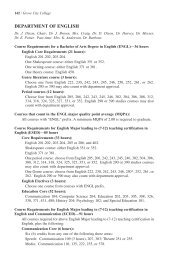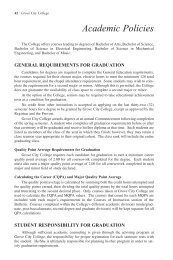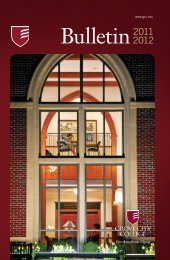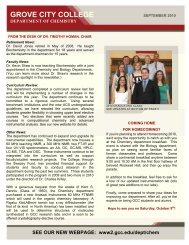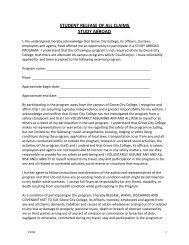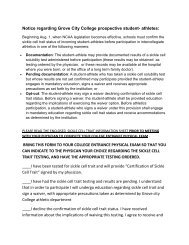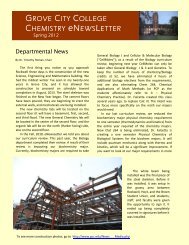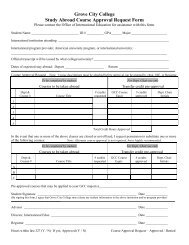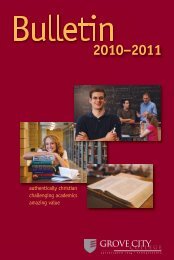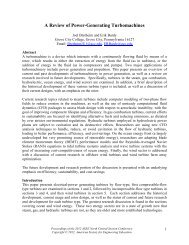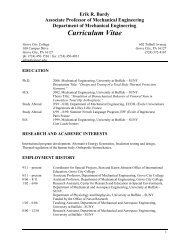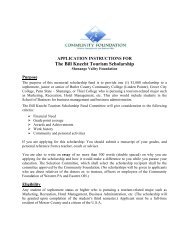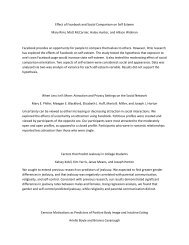2009–2010 - Grove City College
2009–2010 - Grove City College
2009–2010 - Grove City College
You also want an ePaper? Increase the reach of your titles
YUMPU automatically turns print PDFs into web optimized ePapers that Google loves.
PUBLIC ACCOUNTING AND THE CPA EXAM<br />
Accounting / 73<br />
In 1998, the American Institute of Certified Public Accountants went on record as<br />
favoring the requirement that a student complete 150 semester hours of credit before being<br />
permitted to join the profession of certified public accounting and sit for the CPA examination.<br />
Since then, nearly all states or jurisdictions have passed legislation which makes the<br />
“150-hour requirement” mandatory at various effective dates. Students planning careers in<br />
public accounting usually take the Certified Public Accountant (CPA) examination soon<br />
after graduation in the state where they intend to practice. Completion of the <strong>Grove</strong> <strong>City</strong><br />
<strong>College</strong> Bachelor of Science in Accounting, which requires 128 credit hours, prepares the<br />
student to take the examination; however, to meet the new “150-hour requirement” the GCC<br />
student would need 22 additional credit hours. Currently the 150-hour requirement is not<br />
mandatory in Pennsylvania; however, it will go into effect on January 1, 2012. Accounting<br />
majors should consider completing 22 credit hours over and above the Bachelor’s degree<br />
minimum of 128 hours, thereby meeting the 150-hour requirement in effect in other states.<br />
At the time of this Bulletin’s printing, the Department is in the process of developing a proposed<br />
five-year B.S./M.S. in Accounting degree program. Please contact Dr. Baglia,<br />
Department Chair, for more information at dsbaglia@gcc.edu.<br />
ACCOUNTING (ACCT)<br />
ACCT 201. PRINCIPLES OF ACCOUNTING I. This introductory course focuses on the preparation<br />
and use of accounting information in the financial reporting environment. Emphasis is placed on<br />
the understanding and application of steps involved in the accounting cycle as well as on the recognition,<br />
measurement, and reporting issues associated with various financial statement accounts for sole<br />
proprietorships and partnerships. The course also exposes the student to career opportunities in the<br />
accounting profession. Fall semester only, three hours plus lab.<br />
ACCT 202. PRINCIPLES OF ACCOUNTING II. Course topics include accounting for debt and<br />
stockholder’s equity, financial statement analysis, statement of cash flows, as well as introductions to<br />
managerial accounting techniques including cost-volume-profit analysis, budgeting, product costing,<br />
standard costs, and decision-making analysis. Prerequisite: Accounting 201.<br />
Spring semester only, three hours plus lab.<br />
ACCT 260. INDEPENDENT STUDY. Individual study of specialized topics in Accounting.<br />
Sophomore standing and permission of the department chair and a faculty sponsor are required.<br />
Semester course, one, two or three hours.<br />
ACCT 270. INDEPENDENT RESEARCH. An opportunity to conduct supervised research in<br />
Accounting. Sophomore standing and permission of the department chair and a faculty sponsor are<br />
required. Semester course, one, two or three hours.<br />
ACCT 301. INTERMEDIATE ACCOUNTING I. A study of the financial statements with an<br />
emphasis on the asset section of the balance sheet and related information. This course also focuses<br />
on accounting theory and the interpretation of financial accounting standards associated with the balance<br />
sheet. Prerequisite: Accounting 202. Fall semester only, three hours plus lab.<br />
ACCT 302. INTERMEDIATE ACCOUNTING II. A study of the financial statements with an<br />
emphasis on the income statement, statement of cash flows, and liabilities and stockholder’s equity.<br />
Includes topics such as earnings per share (EPS), accounting for income taxes, revenue recognition,<br />
and pensions/leases. This course also focuses on accounting theory and the interpretation of current<br />
financial accounting standards. Prerequisite: Accounting 301.<br />
Spring semester only, three hours and lab.



